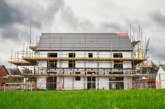
Campaigners are arguing that private redevelopment is destroying social housing and driving low-income families out of inner cities, particularly in London. What do you think?
I watched a documentary that aired last month on BBC One, ‘The Estate We’re In’. Over a time frame of a year, the documentary makers followed the prospects of the West Hendon Estate in North London, which was built in the 1960s to provide 680 council homes. The estate is extremely fortunate in its location, next to the idyllic Welsh Harp Nature Reserve, something the residents are fiercely protective of and one of many reasons they are keen to stay in their locale and not be forced to move away.
The estate is the subject of a multi-million pound regeneration project led by the local council, in partnership with a private developer, and is attracting a large amount of controversy. It can be hard to remain impartial and in this programme, unsurprisingly, the bias fell towards the residents and their plight, with the council’s side on matters reduced to a few sound bites interspersed at various junctures. That said, the residents spoke with passion and it was not difficult to have sympathy for the predicament they face through no fault of their own.
Many look back on their time living on the estate with great nostalgia. One lady who has lived in the flats at West Hendon for some 45 years commented: ‘The community spirit here is amazing, it always has been.’ Another said: ‘These are our homes, these are our memories, these are happy times…’ And a third said: ‘Look at what we have here [whilst gesturing outside her window], we have maisonettes, like little houses, look at the view, we have the forest, the greenery…’
One councillor interviewed by the documentary makers referred to the buildings on the estate as grotty, in need of rebuilding. The plan is to demolish the estate and replace it with 2,000 new flats, however most of which will be for private sale, and therein lies the rub. Understandably residents are upset. Residents fear their community is being torn apart, that the benefits of the new development don’t extend to them.
What was abundantly clear in the documentary was the level of disconnect between the local community and the council and the private developer. If no middle ground can be found, the likelihood of both sides polarising even further increases, which is an incredible shame. With the regeneration agenda firmly in political focus and David Cameron announcing his plans for a widescale estates transformation in January, it is vital we get it right and all party’s work together for the good of all stakeholders involved. The example cited above is an extreme case, but is it an isolated one? There are numerous examples of positive regeneration across the UK where community engagement and resident buy-in is high which counter balances this.
We would be very interested to hear readers’ thoughts on the Government’s estate regeneration plans, the refurb or rebuild debate and of any projects you’re working on to transform local communities.








